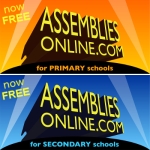To find a suitable FREE assembly use one of these options:
- On the Assemblies drop-down menu are sub-menus for Years 1-2, Years 3-6 and Years 7-11. These will show you all the available assemblies for the selected year groups (NB many of the assemblies for Years 1-6 are included in both primary categories because they are suitable for all these school years).
- Towards the bottom of the side menu are clickable module categories for Assemblies. These will show you all the available assemblies in those categories (across all the year groups).
- At the bottom of each assembly are clickable links. These will show you related assemblies and others in the same module category or year group.
- As more people join us and support this site we will add more assemblies based on the latest films.








